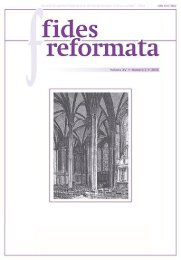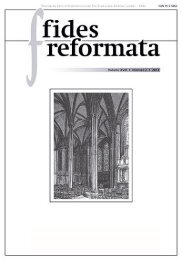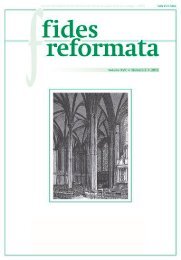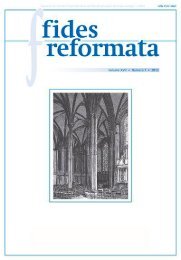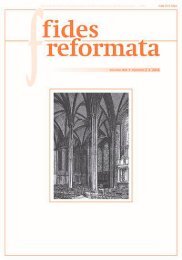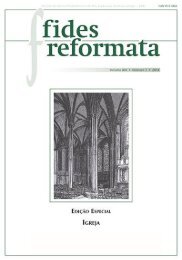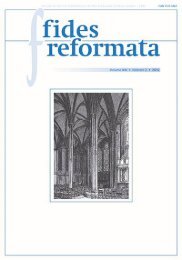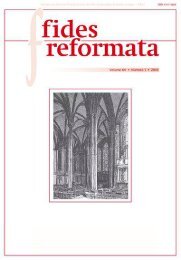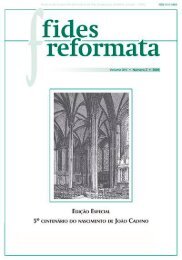You also want an ePaper? Increase the reach of your titles
YUMPU automatically turns print PDFs into web optimized ePapers that Google loves.
Breno Mace<strong>do</strong>, Covenant Theology in the Thought of John Calvin<br />
Calvin sees Yahweh’s promise of preservation and deliverance to Noah<br />
as the Noahic covenant. The promise is a strengthener to Noah’s faith, who<br />
certainly needed it to face the difficult construction of the ark and the many<br />
terrors which were ahead of him, although he was a man of incomparable<br />
faith. 30 The covenant, therefore, is above all a means for Noah to live by faith.<br />
It is an instrument to entice Noah’s trust in the word of God and to help him<br />
“discriminate between life and death.” 31 The Noahic covenant is in general<br />
terms a promise of preservation directed to Noah alone. 32<br />
Calvin uses certain terms in ways different from how they came to be used<br />
in more careful and elaborated views of the covenant. When talking about the<br />
preservation of Noah’s family and of the animals, Calvin calls it a “condition<br />
annexed” to the covenant to encourage Noah in reference to the “replenishing<br />
of the new world.” 33 It is clear by Calvin’s own interpretation that this condition<br />
is not to be fulfilled by Noah but by Yahweh. In seventeenth-century<br />
thought, the condition of the covenant is that part of the divine agreement must<br />
be performed by man, not by God. 34 In light of the later use of the term, what<br />
Calvin means here is an annex to the covenant’s divine promise of life. Another<br />
30 Calvin, Commentaries on Genesis, 1:258, 296.<br />
31 Calvin, Commentaries on Genesis, 1:259. Calvin <strong>do</strong>es not identify the threats of the covenant.<br />
But since the promise of the covenant should assist Noah’s faith to obedience, it seems reasonable to<br />
conclude that for Calvin the threat of the covenant would be to drawn with the rest of the disobedient<br />
human race. Similar to the Adamic Covenant, which promised life upon obedience and death upon disobedience,<br />
so <strong>do</strong>es the Noahic covenant. The clear difference in Calvin’s thought is that the obedience<br />
of Noah to the covenant is only by faith and the object of faith is the promise of the covenant itself.<br />
Calvin will later call this covenant “the covenant of life.” Calvin, Commentaries on Genesis, 1:310.<br />
32 Calvin, Commentaries on Genesis, 1:259. “For there is an understood antithesis, that the whole<br />
world being rejected, the Lord would establish a peculiar covenant with Noah alone.” Emphasis mine.<br />
33 Calvin, Commentaries on Genesis, 1:259.<br />
34 Zacharias Ursinus in regard to the covenant teaches that “this agreement, or reconciliation, is<br />
called a Covenant, because God promises to us certain blessings, and demands from us in return our<br />
obedience, employing also certain solemn ceremonies for the confirmation thereof.” For Ursinus,<br />
covenant promises derive from God and covenant conditions are for men. The conditions of a covenant<br />
are its substance and they are repentance and faith. This element is what leads Ursinus to the conclusion<br />
that “there is but one covenant.” See Zacharias Ursinus, The Commentary of Dr. Zacharias Ursinus on<br />
the Heidelberg Catechism, trans G. W. Williard (Phillipsburg, N.J.: Presbyterian & Reformed Pub. Co.,<br />
1985), 97-100. In a similar fashion Thomas Watson, preaching on question 12 of the Westminster Shorter<br />
Catechism which affirms that God, after creating man, entered into a covenant of life with him upon<br />
condition of perfect obedience, affirms that “the form of the first covenant in innocence was working;<br />
‘Do this and live.’ Working was the ground and condition of man’s justification.” Thomas Watson, Body<br />
of Divinity: Contained in Sermons upon the Assembly’s Catechism, ed. George Rogers (Grand Rapids,<br />
MI: Baker Book House, 1979), 90. Preaching on question <strong>20</strong> of the same catechism, this time on the<br />
covenant of grace, he explains that “it is a covenant of grace, because it is a royal charter, all made up<br />
of terms of grace; that ‘God will cast our sins behind his back;’ that ‘he will love us freely;’ Hos 14:4;<br />
that he will give us a will to accept the mercy of the covenant, and strength to perform the conditions<br />
of the covenant. Ezek 36:67. All this is pure grace.” Watson, Body of Divinity, 107.<br />
96





